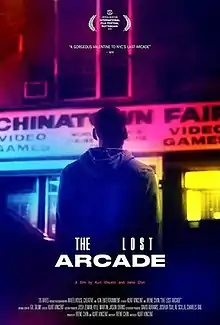The Lost Arcade
The Lost Arcade is a 2015 American documentary film about the influence of the Chinatown Fair arcade on the fighting game community and New York City as a whole. The film was directed by Kurt Vincent and produced by Irene Chin. The documentary features multiple interviews with professional players, in addition to players connected with Chinatown Fair and the new arcade Next Level.[1][2][3]
| The Lost Arcade | |
|---|---|
 Poster | |
| Directed by | Kurt Vincent |
| Produced by | Irene Chin |
| Written by | Irene Chin |
| Music by | Gil Talmi |
| Edited by | Aaron Crozier Thomas Niles Kurt Vincent |
Production company | 26 Aries |
Release date |
|
Running time | 79 minutes |
| Country | United States |
| Language | English |
Production
The film was initially produced via Kickstarter, with funds being raised in response to the news that the Chinatown Fair would be closing and the filmmakers wishing to capture its closing and tell the story of its history. It was originally titled ARCADE: The Last Night At Chinatown Fair.[4] As depicted in the film, the project evolved when Chinatown Fair re-opened in a new form.
Release
The film had its world premiere at the 2015 DOC NYC film festival and European premiere at the 2016 International Film Festival Rotterdam. The film was released in New York City on August 12, 2016 at the Metrograph.[5]
The film began streaming on Prime Video in January 2019. In October 2019, Factory 25, Brooklyn based distributor of narratives and documentaries, added the film to its catalog.
Reception
Reception to the film has been mildly positive. On Rotten Tomatoes, the film has a 67% approval rating among critics, based on 21 reviews.[6] It has a score of 66 out of 100 on Metacritic, based on 8 reviews.[7]
The New York Times called it "wholly enjoyable" and "a love letter to a vanished piece of New York, and a little wish for the future."[8] The New Yorker called the film "raw and intimate."[9] The Guardian referred to it as a "lyrical homage" and "a small gem of a film."[10]
After being released on Prime Video, the documentary received a renewed level of interest, including a New York Times article in January 2019 that referred to the film as "a 2016 documentary about the arcade’s enduring legacy in the city."[11]
References
- Jessica Leigh Hester (2016-07-21). "When Video Game Arcades Were Community Centers". CityLab. Retrieved 2016-07-26.
- Erbland, Kate (2016-07-15). "Film Acquisition Rundown: Oscilloscope Dates 'Girl Asleep,' 26 Aries Sets First Theatrical Release And More". IndieWire. Retrieved 2016-07-26.
- https://thenextweb.com/shareables/2015/11/14/the-lost-arcade-is-a-documentary-revisiting-manhattans-last-penny-arcade/#gref
- "The Lost Arcade". Kickstarter.
- "THE LOST ARCADE Trailer". Film Pulse. Retrieved 2016-07-26.
- The Lost Arcade at Rotten Tomatoes
- "The Lost Arcade Reviews". Metacritic. Retrieved February 14, 2018.
- Jaworowski, Ken. "Review: 'The Lost Arcade,' a Love Letter to Old New York". The New York Times.
- Gregory, Kia. "In Search of "The Lost Arcade"". The New Yorker.
- Hoffman, Jordan. "The Lost Arcade review – lyrical homage to gaming den in New York's Chinatown". The Guardian.
- Williams, Alex. "The Last of Manhattan's Original Video Arcades". The New York Times.
External links
- Official website
- The Lost Arcade at IMDb
- The Lost Arcade at Rotten Tomatoes
- The Lost Arcade at Metacritic
- The Lost Arcade at Box Office Mojo